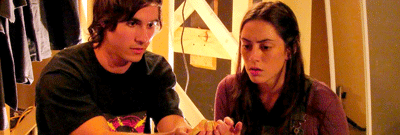 Cubed and Quartered. Claire Bennett’s set for the Road Theatre Company’s production of Mickey Birnbaum’s Big Death, Little Death, which has its West Coast premiere at the company’s Lankershim Arts Center space through July 21, shows a raft-size chunk of ceiling simultaneously before, during and after it breaks free. Similarly, Birnbaum’s nihilistic screed on struggling through adolescence without a believable dream to pursue, attempts concurrently to show the causes, effects and possible future of one family’s loss. The ceiling has collapsed under the weight of a discarded pit bull, which innocently is left for dead at the top of the show and resurfaces like a depth charge as it nears its end. While the puppy matures within the walls of the home, the rooms of the house are filled with an empty embrace of death. There are ghostly appearances by a mother (Rhonda Aldrich) who died in a car wreck after picking up her soldier husband (Jeff Le Beau) back from the first Gulf war. There’s the surviving father’s emotional death, which he attempts to relieve by photographing death scenes. But Birnbaum connects these mini-voids to the vast cultural void that explains everything from infidelity on the home front to infidels at war. The teenage kids, Kristi (Jeanne Syquia) and Gary (Sean Wing), tossed about in this black hole, fill it to distraction with a comparatively safe flirtation with death, Death Metal music (performed live nightly by the scorching pit band nestled house right). Death Metal, an offshoot of rock that probably traces back to Black Sabbath, may not have had the respect of other forms, but it had what it takes to stay relevant long after more mainstream genres got dusty and classic. Whereas those other forms were deaf to the punk, grunge and rap movements, Death Metal's rawness allowed it to feed off them, growing ever heavier and darker. This music is both the most off-putting part of the show (earplugs are eagerly handed out) and the aspect which adds the greatest energy to the production. Like a cubist painter does with images, Birnbaum breaks the narrative into chunks and welds the scenes back together with the band's acetylene torch sound. He’s not always successful, and the whole story sacrifices some impact to its fondness for obfuscation and dead-ends: bringing the dog in as a character may be in the spirit of the show but it does nothing for the nice arc the human characters had going. It’s a fine cast throughout, with standouts by Syquia, Wing, and Ann Noble, as Gary’s quirky guidance counselor Miss Endor, who unravels into a Death Metal erotic reminiscent of Sigourney Weaver’s Zuul in Ghostbusters. The others are Ammar Mahmood, Mark St. Amant and Zach Dulli. It may not be the most cohesive experience in a theater this year. But it is likely to be the most jarring. And thank God there are people willing to dedicate a production slot to that noble cause.
Cubed and Quartered. Claire Bennett’s set for the Road Theatre Company’s production of Mickey Birnbaum’s Big Death, Little Death, which has its West Coast premiere at the company’s Lankershim Arts Center space through July 21, shows a raft-size chunk of ceiling simultaneously before, during and after it breaks free. Similarly, Birnbaum’s nihilistic screed on struggling through adolescence without a believable dream to pursue, attempts concurrently to show the causes, effects and possible future of one family’s loss. The ceiling has collapsed under the weight of a discarded pit bull, which innocently is left for dead at the top of the show and resurfaces like a depth charge as it nears its end. While the puppy matures within the walls of the home, the rooms of the house are filled with an empty embrace of death. There are ghostly appearances by a mother (Rhonda Aldrich) who died in a car wreck after picking up her soldier husband (Jeff Le Beau) back from the first Gulf war. There’s the surviving father’s emotional death, which he attempts to relieve by photographing death scenes. But Birnbaum connects these mini-voids to the vast cultural void that explains everything from infidelity on the home front to infidels at war. The teenage kids, Kristi (Jeanne Syquia) and Gary (Sean Wing), tossed about in this black hole, fill it to distraction with a comparatively safe flirtation with death, Death Metal music (performed live nightly by the scorching pit band nestled house right). Death Metal, an offshoot of rock that probably traces back to Black Sabbath, may not have had the respect of other forms, but it had what it takes to stay relevant long after more mainstream genres got dusty and classic. Whereas those other forms were deaf to the punk, grunge and rap movements, Death Metal's rawness allowed it to feed off them, growing ever heavier and darker. This music is both the most off-putting part of the show (earplugs are eagerly handed out) and the aspect which adds the greatest energy to the production. Like a cubist painter does with images, Birnbaum breaks the narrative into chunks and welds the scenes back together with the band's acetylene torch sound. He’s not always successful, and the whole story sacrifices some impact to its fondness for obfuscation and dead-ends: bringing the dog in as a character may be in the spirit of the show but it does nothing for the nice arc the human characters had going. It’s a fine cast throughout, with standouts by Syquia, Wing, and Ann Noble, as Gary’s quirky guidance counselor Miss Endor, who unravels into a Death Metal erotic reminiscent of Sigourney Weaver’s Zuul in Ghostbusters. The others are Ammar Mahmood, Mark St. Amant and Zach Dulli. It may not be the most cohesive experience in a theater this year. But it is likely to be the most jarring. And thank God there are people willing to dedicate a production slot to that noble cause.Above, Sean Wing and Jeanne Syquia

No comments:
Post a Comment